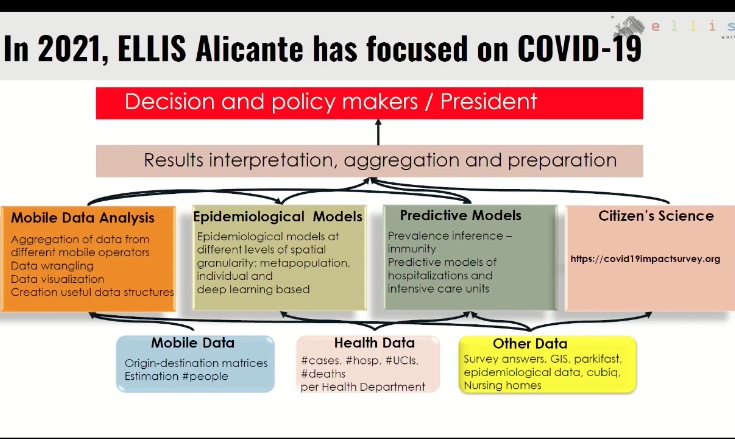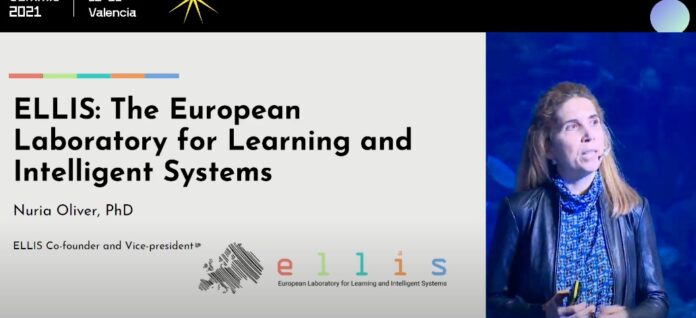Nuria Oliver, Co Founder, ELLIS Foundation is one of the protagonists of the second day of the Valencia Digital Summit 2021. ELLIS, the European Laboratory for Learning and Intelligent Systems, is a network of 30 international laboratories of excellence, including the Max Planck Institute for Intelligent Systems in Germany, Cambridge University and University College London in the UK, the Center for Artificial Intelligence at the Sorbonne in France and ETH in Switzerland. The goal is to enable Europe to compete with the U.S. and China, countries with strong investments in AI, through intensive collaboration among the continent’s best laboratories and the promotion of economic engagement of the different members of the European Union.
ELLIS is a pan-European effort launched in 2018. Its main goal is to promote European research excellence in machine learning and related fields by providing exceptional opportunities for scientists to conduct their research in Europe and to train the next generation of young European researchers in this strategically important field. It focuses on addressing key AI research challenges that promote positive economic and societal impacts. Currently, research topics within the ELLIS network include fundamental machine learning, computer vision, natural language processing, robotics, human-centered and reliable AI, and application areas such as environmental modeling, autonomous system design, biology, and health. The network has made available joint funding of approximately €300 million for an initial period of five years. Research activities will range from machine learning and computer vision to language processing and robotics.
“We are immersed in the fourth industrial revolution and in the same way as the first industrial revolution, this time represents an excellent way to innovate forms and methodologies of approach to science and technology, focusing on the scenarios that more than others will determine the future of European society. We are talking about nanotechnology, genetic engineering and, of course, artificial intelligence. All topics where the U.S. and China are very strong and from which, without the necessary investment, Europe is likely to remain outside” explained Nuria Oliver in Valencia.

According to Oliver, what Europe has lacked is an innovative research environment capable of keeping up with other continents. For this, Ellis bases its foundation on a large research team, with mentoring and engagement programs that pervade major European countries. To date, the best AI labs in Europe are part of the ELLIS network. For example in Italy, the Unit is based in Genoa and was born from the meeting of the expertise of the IIT and the University of Genoa. The Director of the Unit is Massimiliano Pontil, researcher in charge of the IIT Machine Learning Lab and Professor at University College London; while the Deputy Director is Lorenzo Rosasco, Full Professor at the University of Genoa, where he coordinates the Machine Learning center, IIT affiliate and Visiting Professor at MIT in USA. The primary objective is to understand how artificial and natural intelligence work and how they can interact, through a multidisciplinary approach. The possible applications will be in scientific and technological fields, such as the creation of intelligent systems for robotics, the study of computational models for neuroscience, automatic methods of analysis of biomedical, clinical and hospital data. The interaction with the productive, economic and health realities of the country will be important.
The researchers involved are 13, working in different areas of artificial intelligence and machine learning: humanoid robotics, learning and interaction with the surrounding world, also starting from the understanding of human behavior; computer vision and automatic image recognition; cognitive and computational neuroscience; machine learning theories underlying Artificial Intelligence software, with the study of mathematical aspects and health applications.
Oliver sees three areas of research with the biggest economic and social impact. The first is in human behavior modeled by machine learning techniques. The second in the development of intelligent, interactive systems and the last beautiful ethical challenges of decision making systems driven by machine learning. In 2021, ELLIS focused on Covid-19. Aggregated data enabled a process consisting of four pillars: mobile data analytics, epidemiological models, predictive models, and citizen’s science. From this, the organization derived information useful for suggesting informed decisions about pandemic trends, in various European countries.



